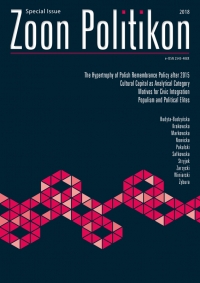Populism and Political Elites
Populism and Political Elites
Author(s): Jan PakulskiSubject(s): Politics, Political Theory, Sociology
Published by: Collegium Civitas
Keywords: populism; populist movements; leadership; antielitism; demagogy; elite degeneration; political decay
Summary/Abstract: Contemporary populist movements – outlined as an ideal type (anti-elitism, demagogy, “citizenism”, conspiratorial views, and embrace of simple solutions) – are analysed according to the Weberian approach that focuses on leadership groups: their styles, structures, rhetorics, and the relationship with followers. Populist leaders emerge – and populist movements appear – at the times of rapid social change and the accompanying crises. But they also herald the decline of trust and moderation among the leaders and activists. This decline results in deep divisions and antagonisms within political elites which is reflected in populist styles rhetoric. Populist ascendancy is ac-companied by degeneration of political elites and political decay, that is weakening the core political institutions of the state, rule of law, and democratic.
Journal: Zoon Politikon
- Issue Year: 9/2018
- Issue No: 1
- Page Range: 1-16
- Page Count: 16
- Language: English

